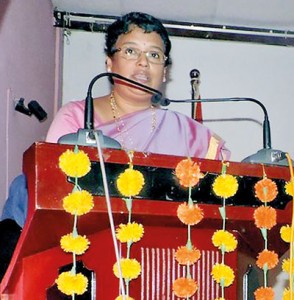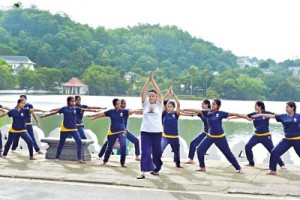Int’l Yoga Day marked with series of events in Kandy
The first International Day of Yoga was celebrated on June 21, 2015. Now known as “International Yoga Day”, it is celebrated in many countries.
“Yoga is an invaluable gift of India’s ancient tradition. It embodies unity of mind and body, thought and action, restraint and fulfillment, harmony between man and nature, a holistic approach to health and well-being. It is not about exercise but to discover the sense of oneness with yourself, the world and the nature. By changing our lifestyle and creating consciousness, it can help in wellbeing.
Let us work towards adopting an International Yoga Day, ” Indian Prime Minister Narendra Modi, said in his address to the United Nations General Assembly (UNGA) in December 2014 proposing the International Day of Yoga. The resolution was supported by 177 nations.
The Assistant High Commission of India, Kandy together with the Department of Ayurveda, Central Province held a series of events on June 19, 20 and 21 to mark the International Day of Yoga in Kandy. Indigenous Medicine, Social Welfare, Probation and Child Care Services Minister Bandula S.B. Yalegama was the chief guest.
Ven. Etipola Mangala Thera of Ampitiya Rajamaha Viharaya, Ven. Thulawala Dhammasiddi Thera, Deputy Principal of Sri Chandananda Buddhist College Kandy, Swami Karthik Chaitanya of the Chinmaya Mission, Prof. H.M.D.R. Herath, Professor of Sociology, University of Peradeniya also graced the occasion.Schoolchildren were present with their teachers as well as other invitees.
The first event was a “Seminar on Yoga and its relations with Veda, Sanskrit and Ayurveda/Traditional Medicine in India and Sri Lanka” held at the Bharatiya Kala Kendra Auditorium of the Assistant High Commission of India on June 19. The seminar was organised at this venue in collaboration with the Department of Ayurveda, Central Province.
Assistant High Commissioner for India, Kandy Radha Venkataraman, addressing the gathering said “Yoga and Ayurveda are two inter-related branches of the same great tree of Vedic knowledge that encompasses all of human life and the entire universe.” They are not two separate disciplines but related healing disciplines of India.
Ayurveda is one of the four Upavedas or secondary Vedic teaching along with Gandharva Veda (music), Sthapatya Veda(directional science) and Dhanur Veda(martial arts). Of these Ayurveda is probably the most important because it addresses all aspects of healing and well-being of body and mind, she said.
The Asst. Indian High Commission, Kandy will continue its interaction with the Central Province Department of Ayurveda to encourage people to adopt Yoga and Ayurveda for a healthy lifestyle.
Provincial Commissioner of Ayurveda, Central Province, Dr. M.D.J. Abeygunawardana, in his address explained that in his proposal to the United Nations General Assembly, the Prime Minister of India had requested June 21 to be the International Day of Yoga as it is the longest day of the year in the northern hemisphere – (shortest in the southern hemisphere).
Ayurveda came from India to Sri Lanka as a traditional system of medicine and Sri Lanka has received two great gifts from India, Buddhism and Ayurveda, he said.
Explaining that mental and spiritual health can be achieved from Yoga and Ayurveda, he emphasizing that it will be very beneficial for students in achieving their academic goals. By practising yoga, the inner happiness of the individual will reflect on the face with a radiance and beauty, he said.
Swami Guru Karthik Chaitanya of the Chinmaya Mission, spoke on the root of Yoga and posed the question “why Yoga?” This very complex subject was explained briefly with a visual presentation on screen. He said “Veda means knowledge and it speaks of six kinds of knowledge.” Individual personality (for Karma yoga), world, God, Sadhana(practice), Moksha (liberation) and Dharma.

Indian Assistant High Commissioner Radha Venkataramana addressing the gathering
The knowledge can be taken from 14 Vidya Sthana – with 4 Veda, 4 Upaveda and 6 Vedanga. The meaning of Yoga is to unite – unite the Body, Mind and Intellect (BMI).
“The question is how to unite, why unite and where to unite?” To find the answer, it is necessary to understand the personalities. 1. Physical personality (for Karma yoga), 2. Emotional personality (for Bhakthi Yoga), 3. Intellectual Yoga (for Gnana Yoga) and Spiritual personality(for Hatha Yoga).
Spiritual personality comes under Raja Yoga which has eight parts, the first part being the Hatha Yoga which is now commonly practised as Asana (yoga postures) and pranay-ama(breathing practice). Raja Yoga is known as the Royal(Raja) or king, the highest path of yoga. Sirasa, one of the Asanas is the most difficult and one has to practise it slowly and systematically for a long time to master it,” he said.
A Yoga demonstration was conducted by Dr. Palitha Jayanetthi and Ms. Chamila. Dr. Jayaneththi said that Hatha Yoga which he explained as starting with breathing practice should be continued for three weeks, 3 to 4 times a day. Chamila demonstrated the sitting posture of meditation, the Asana – the dyana weerasana, padmasana, swasthikasana, sukasana (cross legged), and Vajrasana(cross legged).
A demonstration of Ashtanga Yoga was also given with the participants at the seminar also joining in. Professor H.M.D.R. Herath, Professor of Sociology, University of Peradeniya spoke on the ‘Relations with Veda, Sanskrit and Yoga. Ancient Collaboration and Communications between India and Sri Lanka’.
“Vedas contain the oldest form of the great Sanskrit language which became the prime media of Indian and South Asian culture throughout the centuries. Many thinkers regard Sanskrit as the most perfect language in the world, scientifically formed and mantrically powerful.
It reflects the deeper knowledge behind the Vedic understanding of sound and vibrations. Sanskrit as a Rishi language requires such a great Rishi culture to produce and sustain it.”

Perfect setting: Yoga demonstration around the Kandy Lake
On the Universal Yoga tradition and Sanatana Dharma, the Professor said the Yoga tradition originally called Yoga Dharma presents a remarkable system of spiritual and healing knowledge that can help us reach the highest potential in all aspects of our being whether it is a practice of bodily postures, breath, mantras or meditation or a deep knowledge of the cosmos of energy, mind or consciousness – the scope of yoga is as vast, detailed and profound as the universe itself.”
“Our Ayurveda is derived from Rigveda and our Ayurveda doctors learn medicine from the Sanskrit language,” Prof. Herath said, making a link with Veda, Sanskrit and Yoga between India and Sri Lanka.


